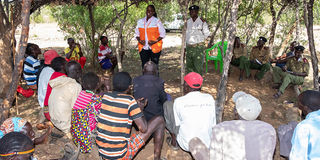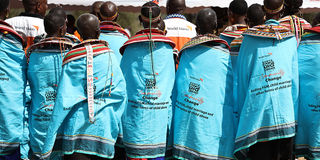Ending female genital mutilation, child marriage and teen pregnancies in Kenya: The need for a multifaceted approach
Sponsored by World Vision Kenya

By David Mbugua
Female genital mutilation/cutting (FGM/C), child marriage, and teenage pregnancy are harmful practices that violate the rights of girls and women in Kenya and globally. Despite being illegal and punishable by law in Kenya, these practices persist, especially in certain communities.
According to the 2022 Kenya Demographic Health Survey, the national FGM/C prevalence has declined to 15 percent from 32 percent in 2003, but barriers remain to eliminating these practices entirely.
A complex, multifaceted approach is required to change mindsets and remove the enabling factors that allow FGM/C, child marriage and teen pregnancies to continue. These issues are interlinked. FGM/C often precedes child marriage, as a cut girl is considered ready for marriage in practicing communities. We must engage entire communities in dialogue to address the significance they attach to these practices.

Community members during a community change (C-change) session facilitated by World Vision and local chiefs, in Baringo County.
For many, FGM/C is considered a rite of passage, ties girls to cultural identity, enhances marriageability, and provides income for circumcisers. The perceived social and economic benefits make ending the practice difficult.
Efforts focused solely on women and girls are insufficient. Deliberate engagement of men is crucial, as they wield significant influence in patriarchal societies. Programmes educating men about the dangers of FGM/C have proven successful in making them more open to marrying uncut women. Engaging community elders is also key, as they are custodians of cultural customs. Educating and influencing the minds of decision-makers in families and communities, both men and women, can spur positive change.
Tackling the root causes by keeping both girls and boys in school is also essential. Improving access to education in FGM/C-prevalent areas helps break the cycle of illiteracy and vulnerability of girls to these harmful practices. Economic empowerment of communities is also important, by providing alternative livelihoods so families are not dependent on practices like FGM/C and child marriage for income.
Organisations like the World Vision under its Kenya Big Dream Programme, use holistic, community-based approaches targeting multiple drivers of FGM/C and child marriage. Their initiatives, spanning education, economic empowerment, changing social norms and engaging local leaders, are driving positive change.
One of their most successful interventions has been community change conversations – intergenerational dialogues aimed at helping communities identify and address the root causes of harmful practices like FGM/C, child marriage and teenage pregnancy.

Community-owned interventions are key to ending FGM-C.
Gradually, through patient engagement and education, communities are embracing change and agreeing to abandon damaging cultural norms.
As Nteyie Lemerdete, a beneficiary, shared: “Through the Community-Change conversations, we learned of the dangers of FGM/C. I decided to take my children who were herding livestock to school. With the knowledge I have, I will not let my daughter go through FGM/C. I want her to be educated so that she becomes a respectable person in society.”
The programme works holistically across generations and genders. Fathers are encouraged to become champions protecting their daughters from being cut. Sons are also educated about respectful relationships and the harms of FGM/C. The programme engages elders, circumcisers, women and men in equal measure, so the whole community is involved in driving change.
Tailored community-owned alternative rites of passage have also been introduced, that retain the coming-of-age significance but remove the cutting.
The programme also helps link girls to educational and economic opportunities so families see a benefit in keeping daughters in school versus marrying them off. With perseverance and respect for local culture, mindsets are gradually transforming.
Combined effort across all sections of society is required to universally improve girls’ wellbeing, choices and freedom. We must continue investing in multilevel interventions to make the rights and dreams of all Kenyan girls a reality.
__________
David Mbugua is the Impact and Communications Officer, World Vision Kenya


